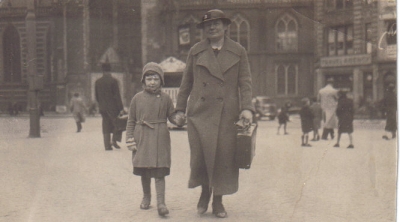
As I promised, I will tell you about the two Jews my mother hid during the war.
My mother's sister married a Jewish man (Uncle Maurits). But, unfortunately, she died young. My mother was very fond of her sister and, rather too soon after my aunt died, my uncle re-married, and introduced his new wife to my mother, who was very upset. I do not think that she saw them very often. I was born several years later, and my mother named me after her sister.
One Sunday morning during the war, the doorbell rang, and there was Uncle Maurits. He asked me whether I knew who he was, and I told him that I did; I had seen photographs. He asked my mother if he could stay for some nights with us; his second wife had also died. He stayed for more than a year. My mother said to me, "I do this for my sister." At that time, I did not understand; I was a child. When I was older I understood everything.
My eldest brother helped the Resistance during the war. A woman in his office betrayed him; he was arrested, and was in prison for eight months. During that period my mother was asked to hide another Jew, and she agreed. Then she thought, "I have a young child; the apartment is small; when they find out that I am hiding Jews, they will execute me." But she took the other man in.
My mother always called him Mr., and then his name. I will not tell his family name, I think that is better. I called him "Meneertje" (little mister). He was an old, little man, and I think he liked it when I said "Meneertje." He had been living in London for fifty years, but he came to visit family in Holland, and then the war began. He had been in a nursing home, when two nurses brought Meneertje to us. I don't know how they got our address.
I think my mother was very brave. Thank God the Germans did not find out.
Sometimes my mother and I had a laugh. Once, I had been to several shops and, when I came home, my mother told me the two men had tried to cut the hair of one another. My uncle did it quickly and well, but Meneertje could not resist laughing when he was cutting my uncle's hair with the clippers. The result was as if rats had been eating it. Another time, I came home from school, my uncle tried to translate a part of a book of Jules Verne in English. He stood behind Meneertje's chair, like a schoolboy, while Meneertje corrected his work.
We lived close to a plane factory, which attracted bombardments. My uncle was scared, and he wanted to go back to Zeist in the neighborhood of Utrecht; I went with him to the station. We heard, later, that he had stayed with several families, and that he passed away in March 1945.
Meneertje was still in our place and, every Sunday, a servant of his family came to our place, although he had far to walk: no trams, no cars. His name was Jan.
Meneertje's sister and her son were sent to Westerbork. That was a camp in Holland, where the Jews were sent first; and afterwards, as you know, they were sent to Poland and Germany. Meneertje asked my mother to buy food in the black market to put it in a parcel, and Jan would take it to the post-office to send to Westerbork.
Jan, who was a very kind man, told my mother that Meneertje's sister and her son had already been taken to Germany. We did not tell Meneertje, too sad. Jan put the parcel under the staircase, and we ate the contents. We had very little to eat. The underground brought coupons for food for Meneertje.
In November 1944, Meneertje became very ill. A deaconess came to wash him, and a Roman Catholic doctor came to see him. That doctor asked my mother if she could get food, because his children were very hungry. But we also had nothing. There was so much solidarity then.
Then Meneertje died. I was so scared, but the underground took him away. Early in the evening, a gentleman came to fetch Meneertje, and my mother asked the man to be careful. She told me afterwards "The man had such faithful eyes," he had said, "Don't worry." She was not frightened any more.
My mother was a very good woman, honest, and helpful.
She deserved a better life than she had.
I am proud of her.
I hope I gave you sufficient information.
This letter was received in May 2011 from the lady who appears as the child in the photograph. Although the two men they took under their protection did not survive more than a year, they could have had a much worse fate.
It would not have occurred to the writer and her late mother that they should have received any award for their good deeds and, by the time I became aware of this tale of courage and determination, there were no independent witnesses.
Edited by Levi Bookin in their honor, and in the honor of all the 'Righteous among the Gentiles.'
Back to Levi's Homepage